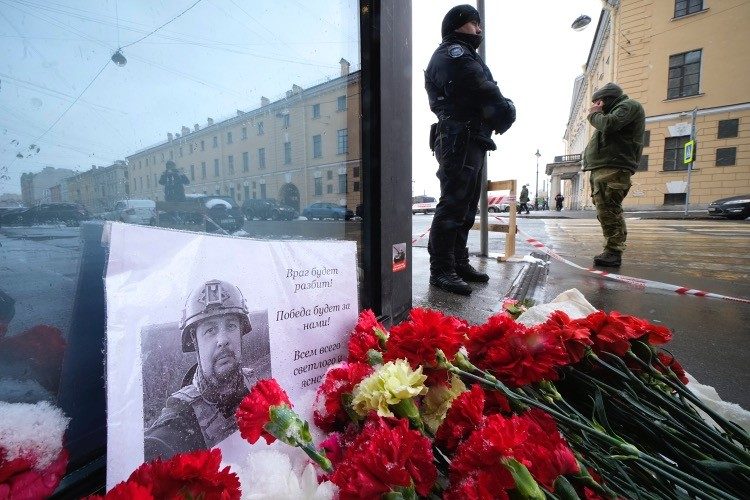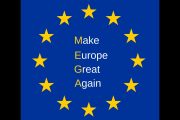
On Sunday, a prominent Russian military blogger was murdered in a bomb blast at a cafe in St. Petersburg in what Kremlin officials are calling a terrorist attack engineered by Ukraine.
Vladlen Tatarsky, born Maxim Yuryevich Fomin, was murdered while speaking to a crowd at the Street Food Bar No. 1 in an explosion that left six others in critical condition.
That same night, Russian police took a female anti-war activist named Daria Trepova into custody according to reports that she supposedly concealed the bomb in a bust of Tatarsky that she presented to him before the explosion.
A video of Trepova declaring her guilt after her arrest has emerged on social media, where she remained silent as to who provided her with the bomb. Also, police added that they were searching for Trepova’s boyfriend, believed to be associated with the anti-Putin underground.
A war journalist and military volunteer with the Lugansk People’s Republic, Tatarsky had amassed an audience of over 560,000 followers on his personal Telegram channel for his reporting, making him one of the most influential bloggers when it came to covering the ongoing Russo-Ukraine conflict.
The Ukrainian-born and pro-Russian Tatarsky was a key figure in the Kremlin’s media campaign promoting Russian actions in Ukraine, consequently facing western sanctions for his efforts.
On that ill-fated day, various pro-Kremlin Telegram correspondents, otherwise known as the “Cyber Z Front,” were holding a panel discussion at the scene of the attack, a cafe that was previously owned by Wagner Group chief Yevgeny Prigozhin.
Tatarsky was a passionate and patriotic military professional who, besides dedicating his life to covering the Ukraine conflict, offered vital constructive criticism that boosted Russia’s military capabilities and eventually saved soldiers’ lives, his journalistic colleagues eulogized in statements to Sputnik News.
“Maxim combined many hypotheses within himself: he fought in the Donbass, he wrote about the conflict and was an excellent publicist who formulated his ideas perfectly, very accurately and to the point,” Evgeny Poddubny, another prominent Russian war correspondent, remarked in an interview.
Tatarsky was a patriot and loved Russia, Poddubny added. “He did a great deal to ensure that things were called by their proper names in our country. This war began for all of us not a year ago, but much earlier. All in all, this is a great loss for our country. Maxim was a leader of public opinion and used his reputation to try to influence the situation for the better. This is a huge loss for the country because every passionate patriot is valuable to Russia and our country needs them.”
The war correspondent slammed Tatarsky’s death as a move by the Ukrainian security services to provoke fear among Russian public opinion leaders, but elaborated that the Ukrainians have succeeded only in stirring public anger, “but definitely not fear.”
Meanwhile, Ukrainian government official Mykhailo Podolyak denied any complicity in Tatarsky’s death, deflecting blame instead to internal Russian power struggles.
In turn, Kremlin spokesman Dmitry Peskov stated that Tatarsky’s atrocious killing proved that Russia must deal with an authoritarian regime in Kyiv that “supports terrorist actions, which is responsible for the murder of Daria Dugina.”
“A regime which quite possibly is behind Fomin’s murder, and behind the terrorist attack in St. Petersburg, which has been responsible for the murder of people for many years, since 2014,” Peskov said.
Also, Russian Ministry of Foreign Affairs spokeswoman Maria Zakharova denounced Tatarsky’s death and slammed the role played by the West, pointing out that Western assaults on Russian journalists were equivalent to a “witch hunt” that reflected acquiescence, if not blatant involvement, in the murder of persons such as Tatarsky as well as Darya Dugina, journalist daughter of the eminent Russian philosopher, Alexander Dugin.
“Not a single case of the violent death of a Russian journalist hailed as a ‘success’ by the Kiev regime and its thugs, has been investigated by Western countries, international organizations, or foreign professional communities, and not even basic human sympathy has been shown,” Zakharova lambasted.
Elaborating, Zakharova berated Kyiv’s “undisguised delight” following Tatarsky’s murder and asserted that the silence of White House, Downing Street, and Elysee Palace “speaks for itself” amid their lip service on the “well-being of journalists and freedom of journalism.”
In August last year, Dugina, a graduate from the Faculty of Philosophy of Moscow State University as well as an activist journalist in the Eurasia Movement that her father founded in 2001 to promote his Eurasianist and multipolar vision in Russia and across the region, was murdered by a car bomb. Before her assassination, Dugina was generally perceived as the heir apparent of Neo-Eurasianism in Russia as she had been the most notable public face of the movement besides her father. Furthermore, Dugina also served as the editor-in-chief of the pro-Russian news portal, United World International.
Not surprisingly, Dugina’s political activism landed her in hot water with some governments in the West. In March and July last year, the United States and U.K. put her on their sanction lists. Notably, the British Foreign Office labeled her as a “frequent and well-known author of disinformation regarding Ukraine on various online platforms.”
Additionally, another Russian patriotic journalist, Igor Mangushev, was shot dead in a gunshot wound to the head in Lugansk last month, in a move that his family decried as an assassination.
Following his “execution-style” shooting at close range at a checkpoint in the Russian-occupied Lugansk region, Mangushev, 36, was hospitalized, but eventually died from his wounds.
Mangushev’s wife asserted that he was the victim of an execution, while friends and colleagues denounced the lack of a proper investigation into his murder.
Mangushev was portrayed as a political strategist who had done work for Wagner mercenary group founder Yevgeny Prigozhin’s media arm as well as co-founder of the Russian nationalist mercenary outfit Enot.
During the war in Ukraine, media outlets have alluded to Mangushev as the leader of a pro-Russian Luhansk region unit and commander of the Russian army’s “anti-drone” platoon.
In response to Tatarsky’s murder, among other killings of pro-Russian journalists and fighters, Russian lawmakers indicated that they would suggest amendments to the Criminal Code to increase punishments for terrorism, such as expanding the list of crimes carrying life sentences, the Duma Security Committee declared Monday.
“In the near future we will propose amendments toughening the punishment for terrorism. Russia’s current Criminal Code already provides punishment for terrorists of up to life imprisonment, but punishment for some crimes is more lenient…. This [amendment] is necessary to protect Russia against the unprecedented threats our country is now exposed to from Ukraine and its Western sponsors,” committee head Vasily Piskarev announced on Telegram.
Piskarev stated that Russia would toughen punishment for any involvement or calls for terrorist attacks as well as public defense or propaganda of terrorism, together with other Criminal Code articles punishing terrorism.
“And, most importantly, we will propose to expand the list of crimes that provide for lifetime imprisonment,” Piskarev noted, stating that anyone who plans a terrorist attack, helps, or defends terrorists should face the harshest punishments.



